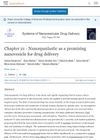10 citations,
February 2022 in “Pharmaceuticals” Smaller curcumin nanocrystals penetrate skin and hair follicles better than larger ones.
 57 citations,
September 2017 in “Journal of controlled release”
57 citations,
September 2017 in “Journal of controlled release” Nanocarrier-loaded gels improve drug delivery for cancer, skin conditions, and hair loss.
 42 citations,
January 2021 in “Journal of Clinical Medicine”
42 citations,
January 2021 in “Journal of Clinical Medicine” Microneedle arrays with nanotechnology show promise for painless drug delivery through the skin but need more research on safety and effectiveness.
2 citations,
December 2023 in “Pharmaceutics” Inhaling medicine may reduce side effects and improve treatment for a major lung cancer type.
 67 citations,
January 2022 in “Theranostics”
67 citations,
January 2022 in “Theranostics” Advanced nanocarrier and microneedle drug delivery methods are more effective, safer, and less invasive for treating skin diseases.
 May 2023 in “Current Medicinal Chemistry”
May 2023 in “Current Medicinal Chemistry” Microneedle patches improve drug delivery for skin treatments and cosmetic enhancements.
54 citations,
June 2020 in “Pharmaceutics” New nanocarriers improve drug delivery for disease treatment.
 19 citations,
May 2021 in “Clinical, Cosmetic and Investigational Dermatology”
19 citations,
May 2021 in “Clinical, Cosmetic and Investigational Dermatology” Minoxidil and finasteride are the best for non-scarring hair loss; more research is needed for scarring hair loss treatments.

Plant-based compounds can improve wound dressings and skin medication delivery.
 8 citations,
May 2021 in “Applied Materials Today”
8 citations,
May 2021 in “Applied Materials Today” New nano composite helps reduce scars and regrow hair during burn wound healing.
 12 citations,
March 2020 in “Journal of Bioactive and Compatible Polymers”
12 citations,
March 2020 in “Journal of Bioactive and Compatible Polymers” Nanoparticles show potential for controlled release of hair loss drugs, improving treatment effectiveness.
 10 citations,
May 2021 in “Expert Opinion on Drug Delivery”
10 citations,
May 2021 in “Expert Opinion on Drug Delivery” Coenzyme Q10 vesicular formulations can potentially treat androgenic alopecia by promoting hair growth and thickness.
 December 2013 in “Biomedical and biopharmaceutical research”
December 2013 in “Biomedical and biopharmaceutical research” Nanotechnology shows promise for better drug delivery and cancer treatment.
 2 citations,
June 2023 in “Gels”
2 citations,
June 2023 in “Gels” Injectable hydrogels are becoming increasingly useful in medicine for drug delivery and tissue repair.
 December 2024 in “Tropical Journal of Natural Product Research”
December 2024 in “Tropical Journal of Natural Product Research” The developed carrier may improve hair growth treatments using brown algae extract.
 96 citations,
September 2021 in “International Journal of Molecular Sciences”
96 citations,
September 2021 in “International Journal of Molecular Sciences” Chitosan, a natural substance, can be used to create tiny particles that effectively deliver various types of drugs, but more work is needed to improve stability and control of drug release.
 January 2022 in “Elsevier eBooks”
January 2022 in “Elsevier eBooks” Nanospanlastics are effective in targeted drug delivery for chronic diseases, improving skin conditions, treating hair loss, and increasing drug absorption.
 28 citations,
January 2017 in “Critical Reviews in Therapeutic Drug Carrier Systems”
28 citations,
January 2017 in “Critical Reviews in Therapeutic Drug Carrier Systems” Nanomaterials in biomedicine can improve treatments but may have risks like toxicity, needing more safety research.
 26 citations,
February 2020 in “International Journal of Biological Macromolecules”
26 citations,
February 2020 in “International Journal of Biological Macromolecules” Chitosan-coated dutasteride nanocapsules improve hair treatment, and physical stimulation boosts effectiveness.
 21 citations,
January 2019 in “Elsevier eBooks”
21 citations,
January 2019 in “Elsevier eBooks” Green-synthesized nanoparticles can effectively target cancer cells, reducing side effects and improving treatment.
 9 citations,
October 2018 in “Elsevier eBooks”
9 citations,
October 2018 in “Elsevier eBooks” Nanotechnology is improving drug delivery and targeting, with promising applications in cancer treatment, gene therapy, and cosmetics, but challenges remain in ensuring precise delivery and safety.
 May 2024 in “International journal of nanomedicine”
May 2024 in “International journal of nanomedicine” Plant-derived extracellular vesicles show promise for treating diseases like cancer and inflammation.
 January 2024 in “Regenerative Biomaterials”
January 2024 in “Regenerative Biomaterials” Metal organic frameworks-based scaffolds show promise for tissue repair due to their unique properties.
1 citations,
August 2022 in “BioMed Research International” Chitosan-decorated nanoparticles can improve skin delivery and reduce side effects of finasteride.
August 2024 in “International Journal of Biological Macromolecules” New gels using cellulose nanocrystals effectively deliver minoxidil to hair follicles, promoting hair regrowth.
October 2022 in “Cosmoderma” 5 citations,
December 2023 in “Materials” Organic and biogenic nanocarriers can improve drug delivery but face challenges like consistency and safety.
 3 citations,
June 2023 in “MedComm”
3 citations,
June 2023 in “MedComm” Stem cells and their exosomes show promise for repairing tissues and healing wounds when delivered effectively, but more research is needed on their tracking and optimal use.
1 citations,
February 2023 in “Ibrain” Black cumin and its nanoformulations show promise in treating neurodegenerative diseases.
1 citations,
January 2022 in “Brazilian Journal of Pharmaceutical Sciences” Minoxidil can be effectively encapsulated in coated nanovesicles for potential drug delivery.




















